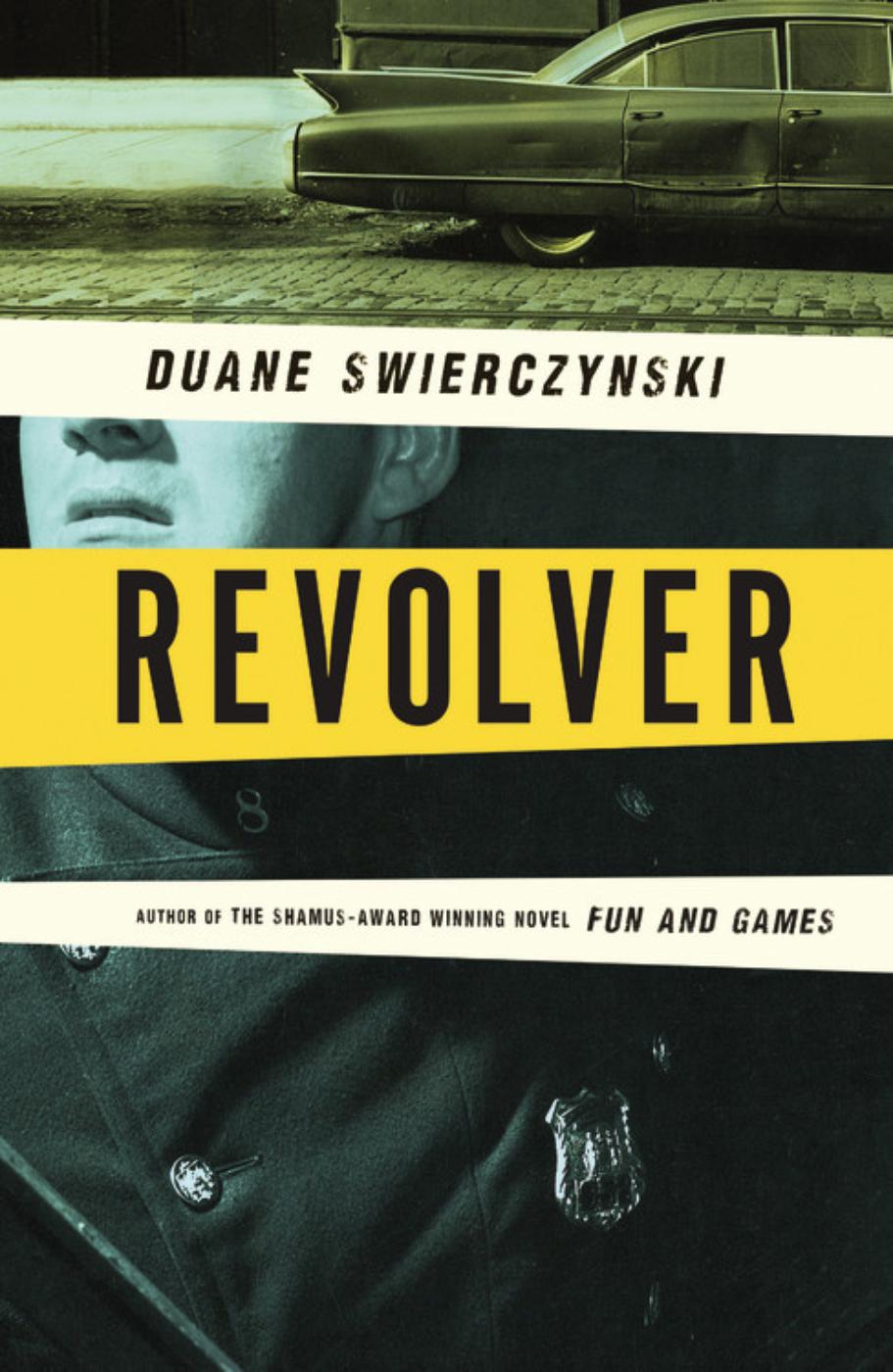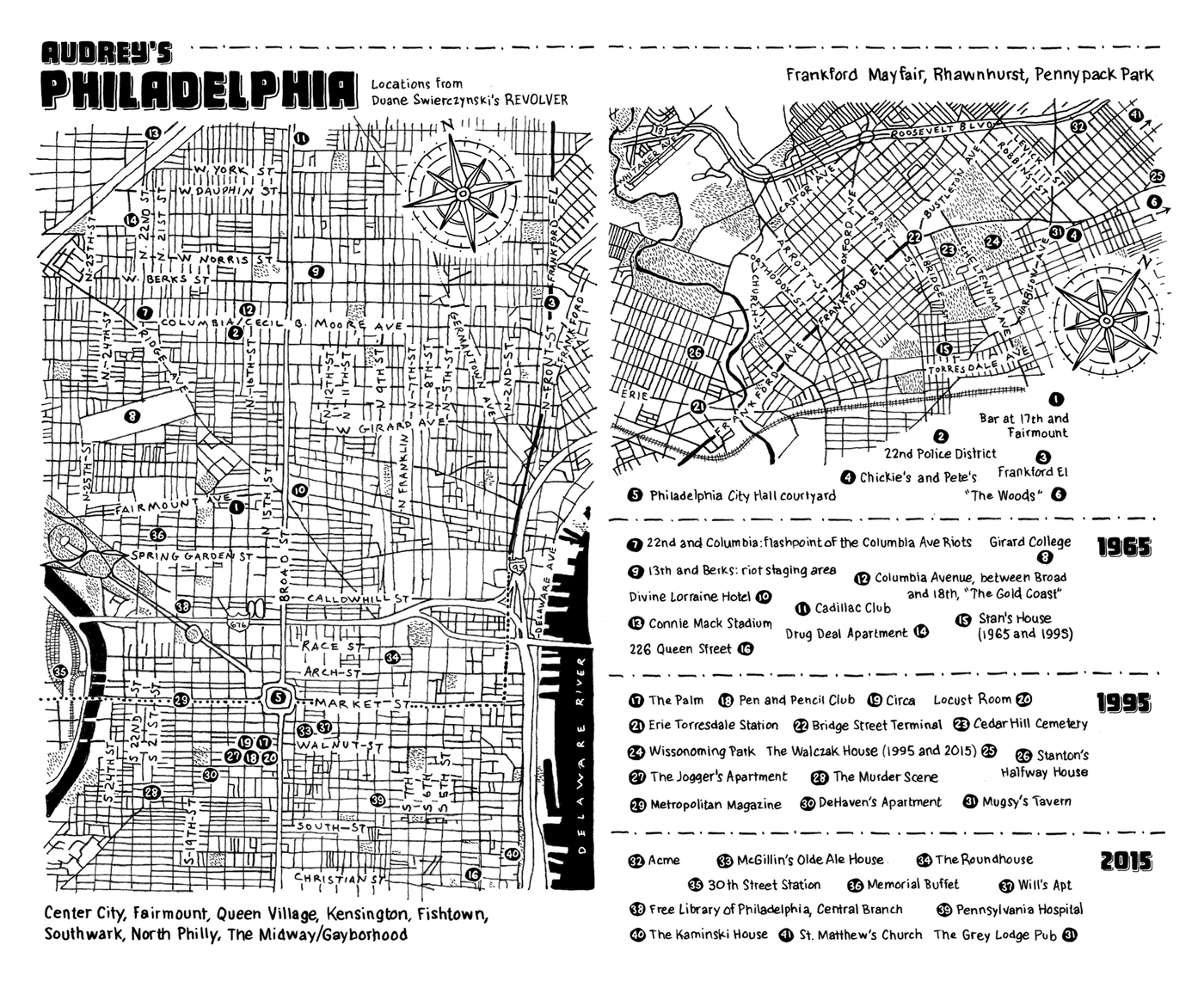Revolver
Authors: Duane Swierczynski



Hachette Book Group supports the right to free expression and the value of copyright. The purpose of copyright is to encourage writers and artists to produce the creative works that enrich our culture.
The scanning, uploading, and distribution of this book without permission is a theft of the author's intellectual property. If you would like permission to use material from the book (other than for review purposes), please contact [email protected]. Thank you for your support of the author's rights.
In memory of
Philadelphia police officer
Joseph T. Swierczynski
1892â1919

Who stole the keeshka?
Someone call a cop
âThe Matys Brothers
May 7, 1965
Officer StanisÅaw “Stan” Walczak usually takes his beer by the gallon, but he's taking it easy this hot spring afternoon. He uses the backs of his thick fingers to wipe away the sweat beading up on his forehead. It's seventy-two degrees and very humid. His Polish blood can't stand the humidity.
He looks over at his partner, George W. Wildey. Unlike Stan, Wildey rarely breaks a sweat. He also hardly ever drinks. But after the week they've had, George said a cold one was most definitely in order. Stan couldn't agree more.
They're in plain clothes, but anybody setting foot in the bar would immediately tag them as cops. No white guy ever hangs out with a black guy in North Philly unless they're undercover fuzz.
Technically, both are shirking duty.
A dozen blocks away, protestors are surrounding Girard College, and Stan and George are supposed to be there to help keep order. Over 130 years ago the richest man in Philadelphia willed most of his considerable fortune to establish a school for “poor, white, male” orphans on the outskirts of the city. Over the next 100 years, neighborhoods rose up around the campus. The neighborhood changed from German to Irish to Jewish and finally to black, even as the students of Girard College remained poor, white, and male.
After
Brown v. Board of Education,
however, blacks began to fight for their seats in the classroom. Picketing by the NAACP began seven days ago, and the commissioner dispatched a thousand police to the scene to make sure nothing got out of hand. The last thing the city wants is another riot like that clusterfuck on Columbia Avenue last August.
Stan and George were assigned to the protests from the very first day. Punishment detail, best they can figure. They must have pissed off someone high up. But despite fears of another riot, nothing has really happened. A few jokers trying to scale the twenty-foot wall onto the campus, but that's been it. Otherwise, just a lot of standing around and waiting. Stan is pretty sure nobody will miss them.
“Still taking Jimmy to the game tonight?” George asks.
“That's the plan,” Stan replies.
“I don't know about the Phils,” George says. “It's the Cards. World Champs. Phillies are gonna have to figure out something new this time around.”
“They'll do all right.”
“You forget the Cards still have Simmons and Sadecki?”
“And we got Dick Allen and Tony Taylor, who's the best second baseman in the game,” Stan says, thick finger bouncing on the bar top to emphasize each syllable. “You wanna talk lefties, look at Covington.”
“Sure, but you're talking about the same team that made twenty-two errors over the last twelve games. That ain't good.”
“They've been on the road. We got ten home games ahead of us.”
“Dreamer.”
Stan has nothing to say to that. He just wants his boy Jimmy to see a good game, recapture some of that feeling from last August when the Phils were unbeatable and the whole city felt like it mattered. Something to look forward to, instead of another summer of dread. He half-drains his beer, reminding himself to take it slow. After all, he has all day to drink.
“Lemme put something on the box,” George says after a while.
Stan nods. “Sure, whatever.”
The taproom is dead quiet. It's just the two of them, plus two winos in the back, each at his own table. The ancient barkeep wipes down the top of the bar, lifts their beers for a swipe, places them back down, never once making eye contact. The rag smells like industrial bleach.
A thought occurs to Stan. He half-spins on his stool, calls out, “Hey, none of that soul shit.”
“Come on,” George says with a big smile. “You love the soul shit.”
Secretly, Stan thinks some of that soul shit isn't half bad. But he wouldn't tell anyone that. Least of all his partner.
George drops the quarter, presses a button. Metal panels, three records on each, a loud metallic
flap
with every push. There's a shockingly diverse mix on this machine, George thinks, as if this juke can't make up its mind if it's in a black bar or a white bar. George makes his selection with a three-number button punch. After a few sips Stan hears Solomon Burke over the tinny speakers. “Got to Get You Off My Mind.”
Stan shakes his head and smiles. Taps his fingers on the bar top like it's a piano.
“Don't worry, Stanny boy,” George says, searching for his final selection, “I've got something special for you coming up next.”
“Yeah, I'm sure.”
Flap. Flap. Flap.
“So what's Jimmy listening to these days? He's the only one with taste in the family.”
Stan's boy Jimmy wants to be a professional musician when he grows up. He's twelve and already pretty good with the guitar, even though he walks around the house playing the same riffs over, and over, and over again. Just like all the bands he listens to.
“He's also listening to some other British group now. The Clinks?”
“Heh heh. The Kinks, man.”
Stan knows that George's son Junior wants to be a musician, too. But he hasn't gotten around to settling on an instrument yet. That's this whole next generation, George said a few weeks back. They all want to be in bands, don't want to put in the work.
I know,
Solomon Burke croons,
it's just a matter of time.
George walks back across the tiled floor, then eases his frame back onto his stool, takes a sip of his beer. “Don't know how you drink this shit all the time.”
“Only way I can put up with you,” Stan says.
 Â
Their snitch is running late. Terrill Lee asked them to meet him here, at this taproom on the corner of Seventeenth and Fairmount.
Stan and George have worked this general neighborhood for the past nine months but have never set foot in this place. They aren't the kind of partners who drink on the job. And the Twenty-Second keeps them plenty busy; it isn't Whitetown.
This taproom has no name. It's a shotgun bar, long and narrow, with a front entrance on Fairmount and a side entrance that most likely used to be marked
FOR LADIES
. A working-class bar that straddles two neighborhoods, white and black. Maybe that's why their snitch picked it. Make both Stan and George feel comfortable.
Stan wishes they'd arranged to meet someplace else.
“Say our man tells us something,” George says. “He tells us something, what are we gonna do about it? And who do we tell?”
“This is going to bring a shitstorm down on our heads, you know that.”
“That's what I'm saying, we cross that line, andâ”
George stops speaking as the front door opens. A burst of harsh sunlight blasts the bar, hot air funnels in. Could be their man.
Nope. Not their man.
This man is a tall and doughy guy in dirty jeans, carrying a hard hat. He pulls the door closed behind him. He hesitates in the vestibule, doing his own reconnaissance. He looks at Stan and Georgeâwhite guy, black guyâthen turns around and leaves. More bright sun, more hot air. The door slams shut.
“Guess he doesn't want to drink with an ugly Polack.”
“Or an ugly
murzyn
.”
“I am a black Adonis, my friend.”
Stan laughs but not for real. Been hard to really laugh these days.
“So what are we gonna do, George?”
“Well, we gotta do
something
. We can agree on that much, right? Can't just pretend none of this shit is happening We gotta take it all the way.”
“Yeah,” Stan says quietly.
They sip their beers. Even George has to admit there's a certain comfort in an ice-cold beer on a hot August day. His daddy would do a 360 in his grave if he saw his son drinking a cold beer. The bartender, nothing else to do, cleans off some of the bottles of rail liquor.
You've found somebody new, and our romance is through.
“Is this supposed to be my surprise?”
“Naw, man, you get three songs for a quarter. Yours is up next. I promise, you're gonna like it.”
“Yeah, yeah.”
Yesterday, at the end of their shift, they decided they'd had enough of the mindless protest duty. So instead of reporting for duty today they drove a few blocks away to go visit an inmate at Eastern State. They convinced him that talking could help him. They were both lying, but it seemed to work. The inmate talked. Now Stan and George almost wish he hadn't.
“You want another one?” Stan asks, gesturing to his empty mug.
“No, but you go ahead. I ain't showing up at home drunk. Carla would have my ass served up with mint jelly.”
“Geez, I'd need a few dozen of these things to get drunk.”
“That ain't what Rosie tells me.”
Stan is about to warn George about talking to his beautiful wife when the third song comes onâa pair of sharp cowbell strikes, a zippy accordion riff, and then a descending bass line into a polka rave-up. George belly-laughsâhe can't hold it in any longer. A goofy smile breaks out over Stan's face, against his own will.
Someone stole the keeshka
Someone stole the keeshka
Someone stole the keeshka
From the butcher's shop
First time Stan played it for George, his partner couldn't stop laughing. It was simply the most absurd song George had ever heard. Oompa, oompa, kishka kishka. What made it even funnier was when Stan told them the performers were local boys from Chester, the Matys Brothers, and they'd recorded the song at Broad and Columbia, the fringes of the Jungle in the heart of North Philly. Stan said it with such pride, which just made George laugh even harder.
“Hey, barkeep,” George calls out over the song, “get my Polish boy here another Schmidt's. Who stole the kishka, man. Heh heh.”
Round and firm and fully packed
It was hanging on the rack
Someone stole the keeshka
When I turned my back
The world-weary bartender looks up as if wondering why a black cop would play a silly polka on the jukebox, then shuffles over to the taps.
At that moment sunlight blasts into the bar, along with another gust of hot air wafting off Fairmount Avenue. Both Stan and George turn to look, half-expecting to see the construction worker again. Maybe changed his mind, decided a cold one here was better than a cold one nowhere.
But it's not the construction worker.
It's a man with a gun.
A revolver.